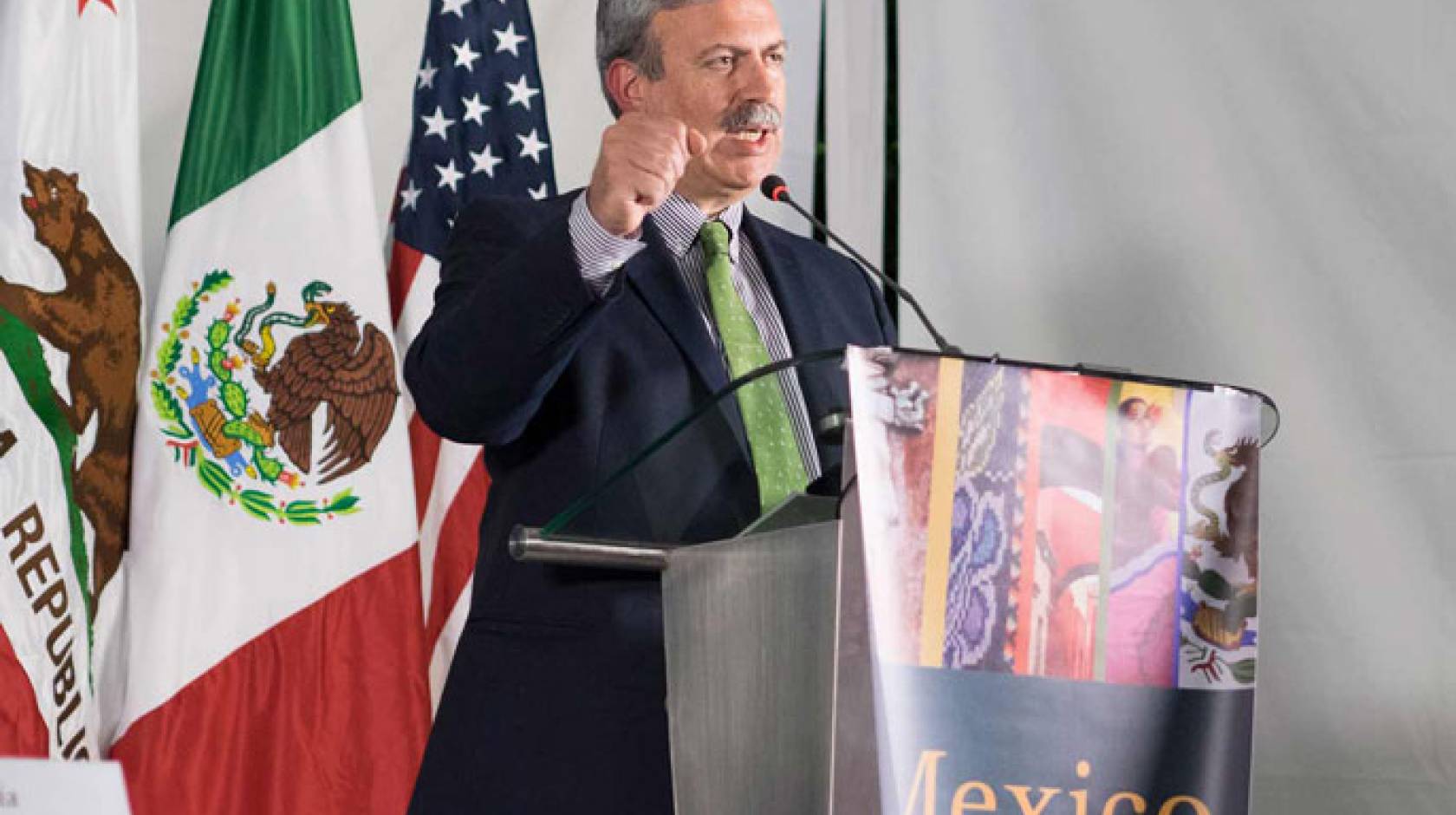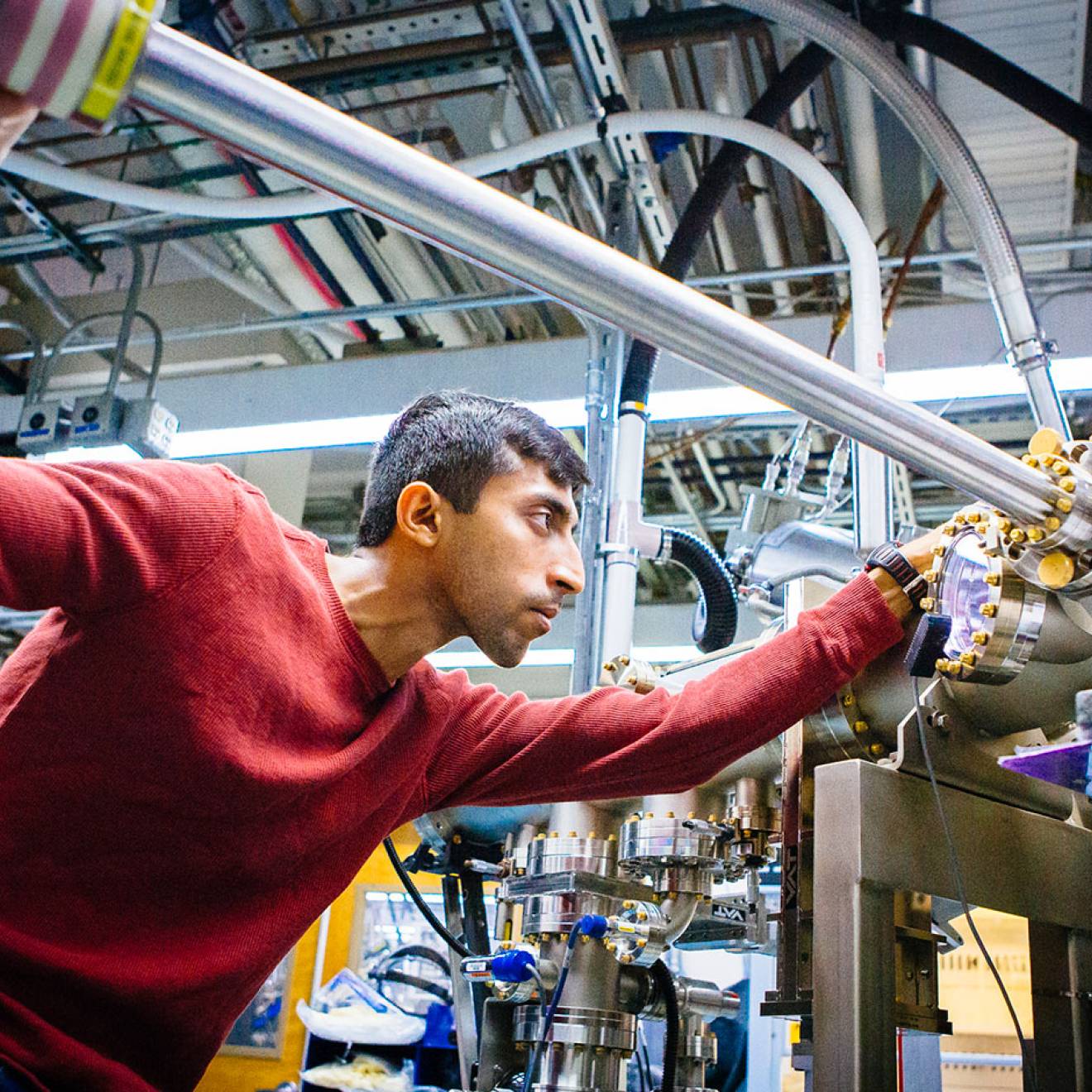Anthony King, UC San Diego

Innovation was the focus of this year’s Mexico Moving Forward, a signature event for UC San Diego’s Center for U.S.-Mexican Studies. For its fifth symposium, the center invited three social entrepreneurs to speak about their work focused on finding solutions to complex social problems and market failures.
The efforts they highlighted in education and work force development boost productivity and increase quality of life across Mexico, especially for women and young people.
This year’s symposium was held in Mexico City at the University of California’s Casa de California, in part to deepen connections between the university and Mexico. More than 100 special guests were invited to listen and participate in the panel discussion, followed by a keynote address from Francisco Gonzalez, director of ProMexico and a former Mexican ambassador.

Credit: Christopher Gagne/UC San Diego
Center for U.S.-Mexican Studies interim director Melissa Floca welcomes guests to the Casa de California.
“Mexico Moving Forward is one of our capstone events that we host each year, typically in San Diego, to focus on the fundamental drivers of positive change in Mexico,” said Melissa Floca, interim director for the Center for U.S.-Mexican Studies (USMEX), located at the School of Global Policy and Strategy. “This year, we traveled to Mexico City to welcome a group of individuals who are transforming Mexico through entrepreneurship and innovation.”
In addition to the keynote speaker, panelists included Leticia Jauregui, founder of CREA; Alfonso Tames, CEO of Materiam; and Maria Novales-Flamarique, Generation Mexico director at the McKinsey Social Initiative. Escalera Foundation director Molly Fisher moderated.
“All five of our guests embody the leadership and entrepreneurial spirt that are crucial ingredients to moving Mexico forward through creating opportunities,” Floca said.
Access, productivity and support
CREA’s focus is training and advising low-income women entrepreneurs in rural and marginalized communities to strengthen and grow their businesses. In part, they provide a roadmap of business development and financial training, Jauregui said, and provide consultation on where to find funding.
“You’ve heard of the phrase ‘A company is too big to fail.’ For our women, everyone says ‘They’re too little to succeed,’” Jauregui said. “We think that these women actually are the ones who are shaping the communities, and they’re the ones who are providing 70 percent of employment in the country for other women. So if they don’t grow, then we have a big problem as a country.”
Jauregui and Tames said they find entrepreneurs across all of Mexico, particularly away from city centers where capital, supplies and mentors are located. The two work to get those needs to the people, in the communities in which they live. Through CREA’s programs, Jauregui says they see productivity increase 27 percent and income 32 percent.

Credit: Christopher Gagne/UC San Diego
“[The majority] of women who want to become entrepreneurs in Mexico don’t want to become entrepreneurs because of an opportunity they see in the market, but because they need to self-employ,” she said. “If we focus on innovation for the top one percent … the country is not going to grow. What we aim to do is to empower the 99 percent to innovate, to become much more creative.”
Tames said Materiam’s main mission is to democratize innovation and productivity in Mexico by offering students, entrepreneurs and small businesses advanced technologies for digital production, as well as the skills and knowledge needed to develop new products. This, he said, also adds value and depth to Mexico’s economy.
McKinsey’s Generation program is a global project with the goal of integrating 1 million young people into the labor market in the next five years. It provides youth the skills and support needed to gain and keep jobs, often their first. Their methodology is intended to be replicated and scale-able to locations around the world, and Novales-Flamarique outlined the key components they have found to ensure a success rate at over 90 percent.
“We don’t do anything if we don’t have employers willing to interview and hire our youth,” she said, listing mentorship, skills mapping, motivation and, most important, personal connections between the participants as important factors. “They learn from each other; they grow from each other.”
Sharing skills was also a focus for the keynote, given by ProMexico CEO Gonzalez. Gonzalez, whose professional experience spans both the private and public sectors, has held several high-level positions related to the promotion of Mexico abroad. ProMexico’s key vision is the promotion of international businesses in the country.
“For our government, innovation is the cornerstone of our country’s economic spirit,” Gonzalez said. “We know we need it to actively promote entrepreneurship, and spending heavily on human capital is key to the future for Mexico.”
Outreach across Mexico City
UC San Diego interim Executive Vice Chancellor Peter Cowhey attended Mexico Moving Forward in addition to several other events organized by the School of Global Policy and Strategy. Cowhey and the group hosted guest speakers on politics and elections, a discussion on the Mexico and U.S. economies at Mexico’s central bank, a luncheon on education reform, and a special breakfast meeting with Roberta Jacobson, the current U.S. ambassador to Mexico.

Credit: Christopher Gagne/UC San Diego
“You cannot be one of the world’s great research universities unless you are situating yourself in a network of the creation of knowledge and education. For UC San Diego, we have to decide who our partners are in creating knowledge, who our partners are in figuring out ways to apply that knowledge, who our partners are in education and finally, who our partners are in providing service to society,” Cowhey said. “We cannot imagine a global strategy where Mexico is not one of the central cornerstones of that strategy. Both by location and by mission, this is just essential.”
At Mexico’s central bank, Global Policy and Strategy acting Dean Gordon Hanson led a conversation with two UC San Diego alumni, Daniel Chiquiar and Carlos Capistran. After receiving their doctorate degrees from the Department of Economics, both returned to Mexico and began working for the central bank. Capistran now works for Bank of America Merrill Lynch, and both are high level, chief economists.
“You represent the best of UC San Diego. You’ve taken your training, and gone out and excelled professionally,” Hanson said during the panel. “You’re doing us proud, and you’re doing a great service to Mexico.”
At a lunch presentation on education and migration with Mexico’s undersecretary of elementary education, Floca discussed research she and a group of scholars from The Civil Rights Project at UCLA have undertaken, focusing on the aspirations and struggles of students who are educated on both sides of the border. The research — partially conducted by UC San Diego undergraduates as part of the Mexico Migration Field Research Project — is included in system-wide University of California Mexico Initiative.
“The Center for U.S.-Mexican Studies is engaged in ground-breaking work in understanding a path forward for the U.S.-Mexico relationship, and communicating to both countries the value of that relationship,” Hanson said. “We view Mexico as one of the central pillars of our engagement in the Pacific region and that’s why our Center for U.S.-Mexican Studies is so important. Part of the motivation for coming to Mexico City was to help devise the next phase of action, and our time here has been immensely valuable.”
This year’s Mexico Moving Forward will be broadcast on University of California Television, UCTV, on a future date. For more information on Mexico Moving Forward, visit the Center for U.S.-Mexican Studies at the School of Global Policy and Strategy.

